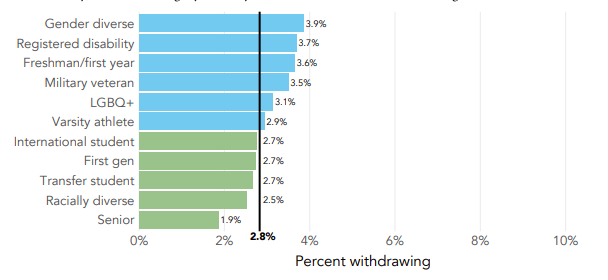You have /5 articles left.
Sign up for a free account or log in.

Students who didn’t withdraw from their college typically experienced greater decreases in distress throughout their counseling center treatments, new research shows.
Kemal Yildirim/E+/Getty Images
Factors ranging from financial stress to participation in extracurriculars can influence whether a student receiving services at their university’s counseling center will voluntarily withdraw from the institution, according to new research from Pennsylvania State University’s Center for Collegiate Mental Health.
The center’s 2022 annual report analyzes the cases of 4,415 students who withdrew from an institution of higher education while in counseling between 2017 and 2022. Those who withdrew made up 2.8 percent of the 156,257 total students from 95 college or university counseling centers who had a CCMH case closure form on file. Such forms are often completed after a student ends their care at a campus counseling center and typically outline critical events that occurred while the student was in treatment, as well as why the counseling stopped.
The research is the first large-scale report on risk factors for voluntary withdrawal and how counseling can impact students’ academic completion, according to the report.
“We know student success is a critical priority for all institutions. It’s becoming increasingly more important that institutions not only retain students but help them succeed,” said Brett Scofield, CCMH’s executive director, explaining why the center chose to analyze data related to withdrawals.
Factors such as demographic information, past mental health treatment and distress levels can help predict whether a student entering counseling will voluntarily withdraw from college. Populations more likely than the average student receiving on-campus counseling to drop out included gender-diverse students (3.9 percent), disabled students (3.7 percent) and first-year students (3.6 percent). Racially diverse students and first-generation students were slightly less likely than the average student in counseling to withdraw, at 2.5 percent and 2.7 percent respectively.
 Robin G. Isserles, a professor of sociology at the Borough of Manhattan Community College and author of the book The Costs of Completion: Student Success in Community College (Johns Hopkins University Press, 2021), questioned whether those numbers would have been higher among students who had not sought counseling. She speculated that the findings show not that first-generation students are less likely to withdraw on the whole, but that they may benefit more from counseling services.
Robin G. Isserles, a professor of sociology at the Borough of Manhattan Community College and author of the book The Costs of Completion: Student Success in Community College (Johns Hopkins University Press, 2021), questioned whether those numbers would have been higher among students who had not sought counseling. She speculated that the findings show not that first-generation students are less likely to withdraw on the whole, but that they may benefit more from counseling services.
“If we are to assume many first-gen students don’t have access to mental health [services] … perhaps it’s really working for them,” she said. “That, to me, was an interesting kernel of something to explore more.”
Students who had received past mental health treatments generally withdrew at a higher rate than the average student in on-campus counseling; those who had been admitted to psychiatric hospitals or treated for alcohol or drug abuse were almost twice as likely to withdraw, with 5.1 percent of each group stopping out.
Students who self-reported various areas of distress, such as social anxiety (3.2 percent) and depression (3.5 percent), were at increased risk of withdrawal. Students who reported either current (3.2 percent) or childhood financial stress (3 percent) were also at increased risk of withdrawal. However, academic distress was the strongest indicator of withdrawal risk, with 4 percent of those students leaving college. Therapist-identified mental health challenges were also strong predictors of withdrawal; students who experienced psychotic thoughts or behaviors withdrew at a rate of 8.7 percent, nearly three times higher than the average student, although the report noted that such symptoms are quite rare, presenting in fewer than 1 percent of clients.
Some indicators actually seem to have helped students stay enrolled. Those who were employed (2.5 percent), received family or social support (2.5 percent each), or participated in extracurriculars (2.3 percent) were at decreased risk of withdrawal, compared with the overall rate of 2.8 percent.
Scofield said now that it’s clear how impactful these factors can be in predicting academic success, counselors should help students try to address them—even if they aren’t within the counselors’ purview.
“It’s important for therapists to be aware of the wide range of risk factors and that some of these things involve things you deal with in treatment, but other parts of this will include involving other support services to help the student. For example, academic services or disability services or cultural services that might support the student, because the risk factors aren’t all mental health related,” he said. “The message for therapists is that the risk factors are wide-ranging.”
Counseling Helps
The report also showed that students who stayed at their institution generally improved more than those who withdrew over the course of their treatment, both in overall distress and in specific areas like social anxiety and depression, as measured by the Counseling Center Assessment of Psychological Symptoms.
Scofield said the data indicate that effective counseling can be an important tool for student success.
“Counseling centers nationwide provide critical services that support the academic mission of institutions,” he said.
Nevertheless, Scofield acknowledged that withdrawing is sometimes the best option for a student’s mental health.
“Even though we were able to demonstrate that counseling centers contribute to retention, there are many reasons why a student should withdraw from the school,” he said. “They could be going through critical circumstances where withdrawal is the only good option right now.”
The report also looked at long-term trends in mental health, noting that a history of trauma is the factor impacting student mental health that has increased the most in the past 10 years. In the 2021–22 academic year, the share of students who reported experiencing trauma—mainly sexual violence and childhood emotional abuse—had increased by more than 14 percent over 10 years earlier.
Some experts, like Scofield, believe that the jump reflects students growing more comfortable reporting their trauma, or becoming increasingly aware of what it actually means to experience trauma, rather than an increase in traumatic experiences.
Allison Buskirk-Cohen, chair of the psychology department at Delaware Valley University and co-editor of Cultivating Student Success: A Multi-faceted Approach to Working With Emerging Adults in Higher Education (Oxford University Press, 2021), said that these findings further emphasize the importance of educating counseling center staffs—and larger university communities—about trauma.
“This really speaks to the need for counseling center staff to have training on trauma so they can provide the appropriate support … All staff on a college campus need more training in this area,” she said.




